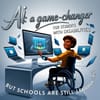Artificial intelligence (AI) is revolutionizing the educational landscape, particularly for students with disabilities. AI-powered tools are providing unprecedented support, enabling students to overcome barriers and achieve academic success.
AI-driven technologies, such as text-to-speech software, speech-to-text systems, and predictive text tools, are helping students with disabilities to read, write, and communicate more effectively. These tools are also facilitating greater accessibility and inclusivity in the classroom.
However, despite the vast potential of AI, schools are still grappling with how to effectively harness its power. Teachers and administrators require training and support to integrate AI-powered tools into their teaching practices and to ensure that these tools are used in a way that complements traditional teaching methods.
Moreover, concerns around equity and access persist, as not all schools have equal access to AI-powered tools and technologies. Addressing these challenges will be crucial to ensuring that AI benefits all students, particularly those with disabilities.


